Department of Preventive Medicine marks 70 years of studying disease, helping patients live better
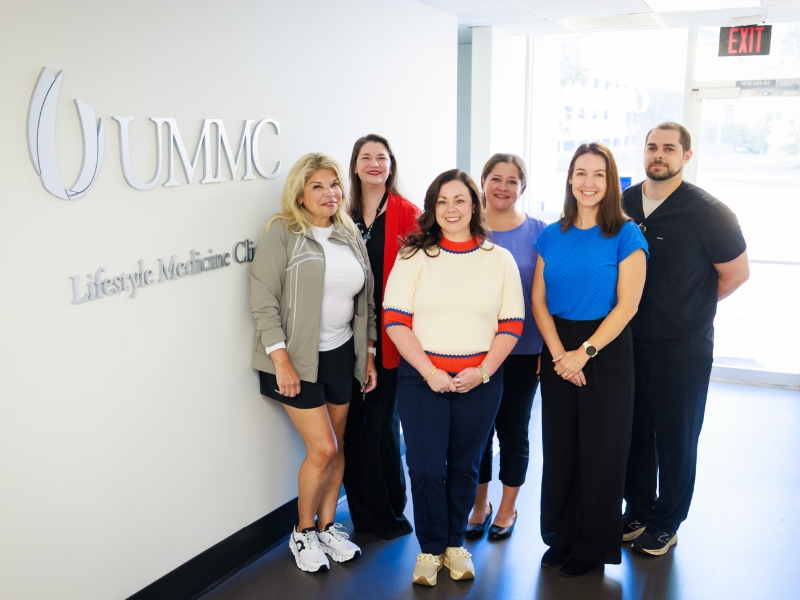
Editor’s Note: To commemorate the University of Mississippi Medical Center’s 70th anniversary, we will feature a series of stories throughout the year on the original School of Medicine departments established in 1955.
The Department of Preventive Medicine at the University of Mississippi Medical Center strives to promote the best ways to protect and educate the public about preventable diseases from influenza and measles to chronic conditions such as obesity and high blood pressure.
The work to improve the health of Mississippians began in the fall of 1955 with a smaller list of priorities but no less serious for the times. Two of the first three fellowships awarded by the School of Medicine focused on the epidemiology of polio – a persistent epidemic in the first half of the 20th century – in Mississippi children who’d received Dr. Jonas Salk’s groundbreaking vaccine and those who had not.
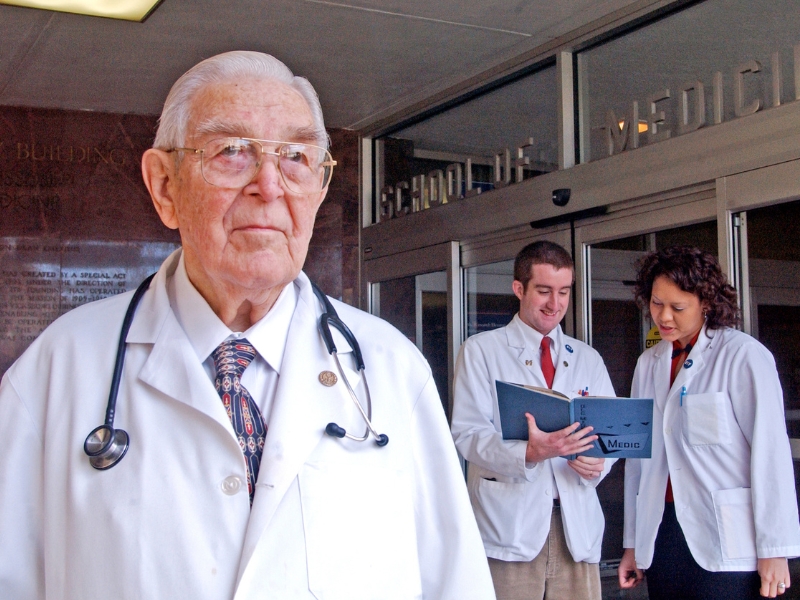
The department’s first chair, Dr. Thomas J. Brooks, was among the original Oxford faculty who opened the new school in Jackson. He was uniquely qualified to bring an understanding to how communicable diseases shaped public health, as he had four university degrees including the first PhD in public health conferred by the University of North Carolina.
“There wasn’t a lot of training in preventive health during that time,” said Browning Brooks Edmonds, a retired communications and marketing specialist in Florida and one of his two daughters and four children. “It was good for the University of Mississippi to have included from the get-go the concept of prevention into the Medical Center, which was a perfect fit with my father’s area of expertise.
“He wanted to work against needless suffering by not only curing diseases but also using important public health research and programs to prevent people from ever becoming ill.”
The first year saw the department’s three divisions of epidemiology, general practice and parasitology open a family care clinic and participate in a workshop on syphilis. By the late 1960s, sections on medical genetics and biostatistics were added, which extended the department’s research capabilities to areas such as chromosomal analyses in children with developmental conditions. Brooks’ chairmanship ended with his retirement in 1981, three years before the department’s Division of Biostatistics purchased a set of computers that tied into the Medical Center’s mainframe for the first time.
By 1995, the department and society at large were moving rapidly into the internet age. At the same time, the UMMC Wellness Center was established under epidemiology division head, Dr. John C. Higginbotham, to encourage healthy lifestyles and personal wellness away from the modern-day workstation – a portent of things to come for preventive medicine in the new century.
Pause and rebirth
Following a brief hiatus of the department in the early 2000s, Dr. Joshua Mann was named chair in 2015 and began working with the School of Medicine on a mission focused on preventive and public. Its first five years saw the creation of the Everyday Wellness program for employees and involvement in three departments that formed the John D. Bower School of Population Health.
The department’s first resident was enrolled as the residency program itself was accredited, becoming the only Public Health and General Preventive Medicine residency program in Mississippi. The Lifestyle Medicine Clinic was launched in 2017 to help patients eat better, exercise more, manage stress and stop addictive behaviors harmful to health. The clinic also sees cancer patients to incorporate similar holistic strategies to address side effects of their treatment.
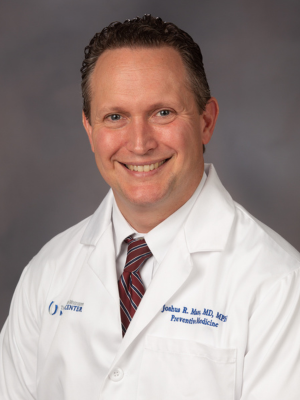
“One thing mentioned repeatedly when I interviewed for the job of chair was the need to focus on risk factors obesity, diabetes, hypertension and other related chronic diseases,” Mann said. “It was clear we needed prevention-focused clinical service that was tapped into the needs of our community and patient population.”
Dr. Josie Bidwell, a member of the School of Nursing faculty at the time, was a logical choice to lead the clinic due to her interests in nutrition and healthy lifestyles, Mann said.
“What began as a deal I worked out with SON for her to work one day per week to lead our clinic in space donated by the Department of Family Medicine has grown to the multifaceted clinical service it is today,” he said.
Another institutional service area, the Office of Well-Being, was created in 2018 first under Dr. Mann’s leadership and now led by Bidwell, professor and clinical director in the department. The office’s services have grown to address issues of workplace stress and violence, based on both employee surveys and available data from academic medical centers nationwide.
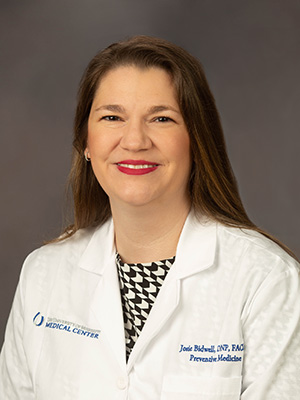
“We’ve grown from a vision to a movement that includes strengthening support systems, elevating engagement and transforming our culture,” Bidwell said.
One example of that growth is in the Resilience in Stressful Events, or RISE, program, which offers mental health and resilience resources in the form of peer support and crisis intervention. It’s expanded from 19 trained peer supporters at its start to more than 40 today, she said.
“This growth reflects our commitment to ensuring that every member of our UMMC community has access to compassionate, confidential support when they need it most,” she said.
Serving students and employees amid pandemic, records overhaul
The COVID-19 pandemic and the career-defining challenges it posed for health care workers arrived at the department’s doorstep in late 2020 as it took in the Office of Student and Employee Health.
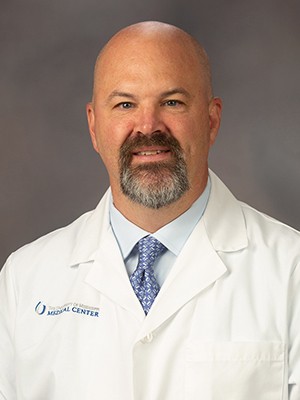
“Our challenge involved the pressing tasks of ensuring the health and safety of the workforce, guiding hospital policy and institutional response,” said Dr. Brian Williams, medical director for the office and residency director for public health and general preventive medicine. “This included employee assessments, back-to-work decisions, and eventually mounting a COVID-19 vaccine campaign. At the same time, we overhauled our electronic medical record system and completed training for all our processes. Our staff of about a dozen rose to this challenge and our efficiency and effectiveness reflects this.”
Since becoming a service line within Preventive Medicine, the staff has been most visible outside the office setting when handling the annual delivery of seasonal flu shots to students and employees. It also played a part in bringing UMMC into compliance with Joint Commission and other oversight bodies for respirator fit testing by identifying which employees need N95-level or above respiratory protection during everyday clinical duties.
SEH’s daily activity involves occupational health assessments, physical exams and other screenings for new employees and new students and treats and manages employee injuries to help prevent them from happening and mitigate workplace hazards. The office also helps manage hand hygiene and communicable disease exposures to protect employees and patients.
Lifestyle clinic improves lives of patients
More than 23,500 visits have been made to the Lifestyle Medicine Clinic since its inception. Among more than 6,000 on track to have visited in 2025 is Deborah Hall, 61, of Madison.
Hall’s health took a turn for the worse this past summer when the diagnosis of liver disease and related complications prompted gall bladder surgery.
“I was told by my primary doctor at the time I simply had a bug,” she said. “But, my husband and everyone else could see my skin and eyes were turning yellow.”
Life on the road as a traveling health insurance benefits specialist and being a caregiver for two other adults at home – her mother, who has dementia, and her 18-year-old nephew– made for a workload that got too heavy to carry.
“I told my doctors when I first started coming to UMMC was that I felt like I had fallen off the bus,” she said. “I needed help to get back on it. My diagnosis ended up being something of a blessing in disguise because I’ve come to know the kind of care the Department of Preventive Medicine and UMMC as a whole can provide to someone in my situation.”
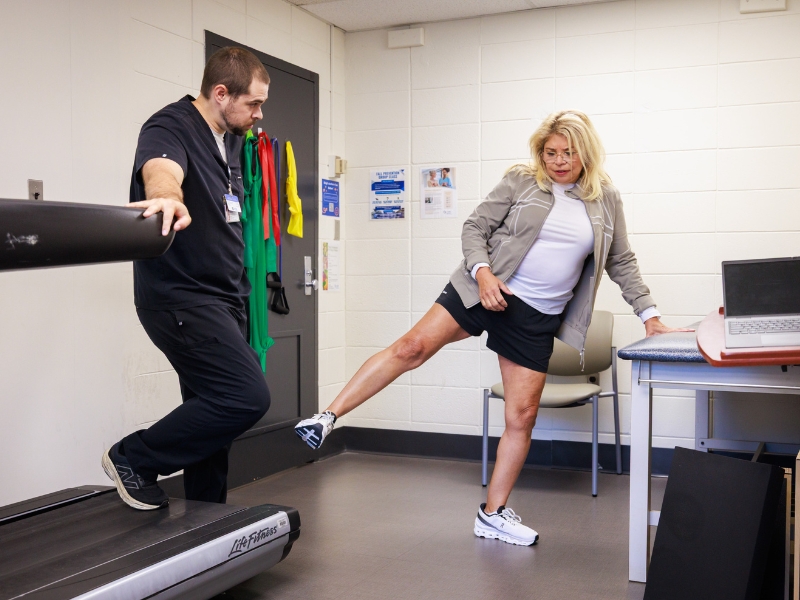
Hall’s care team now includes regular exercise sessions in the clinic with an exercise physiologist and various counseling sessions to reinforce the notion of mindful eating habits.
“My family is one that was raised eating things only if it was battered and deep-fried in something,” she said. “We’re having a conversation about Thanksgiving right now, but I know my care team will keep me eating right and keeping this thing going of feeling younger again.
“I don’t have a tee shirt that says UMMC yet, but if I did, I’d sure wear it!”
Grants fund partnerships to better public health
The department’s faculty lead a robust research portfolio with significant external grant funding, and they have earned recognition at UMMC including one platinum research award winner, two gold research award winners, and one silver research award winner.
Since 2020, the Community Engagement Research Alliance Against COVID-19, or CEAL, has won about $11 million in grants to stem the severity of the pandemic and other chronic diseases in disproportionately affected communities, with the help of partners statewide.
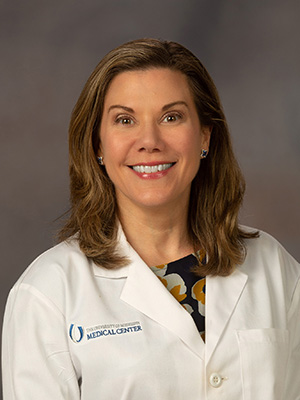
“Based on the infrastructure, networks and success of our CEAL team’s COVID-19 work in Mississippi, the focus has shifted to two important issues in the state – food insecurity and maternal health,” said Dr. Caroline Compretta, associate vice chancellor for research and the project’s director. “We are working with faith, community, tribal and public health partners from across the state to address these issues at the community level and improve health across the state.”
The Mississippi Diabetes Project, funded for preventive health by the Department of Health and Human Services via the Centers for Disease Control and Prevention, aims to promote health equity in care and prevention of the condition with $5 million in grant funds over the next five years. The state ranks second in the nation for the number of people living with diabetes.
Teaching first- and second-year medical students the value of incorporating healthy nutrition counseling into their patient encounters is the goal of the most recently-approved center funded through the department, the Bower Center for Culinary Medicine.
“It’s similar to what we do in the lifestyle clinic for patients, but for students in their future instruction,” Mann said. “We think nutrition is an area that’s highly relevant to all facets of health care. We hope to expand it to students from multiple programs of study.”


